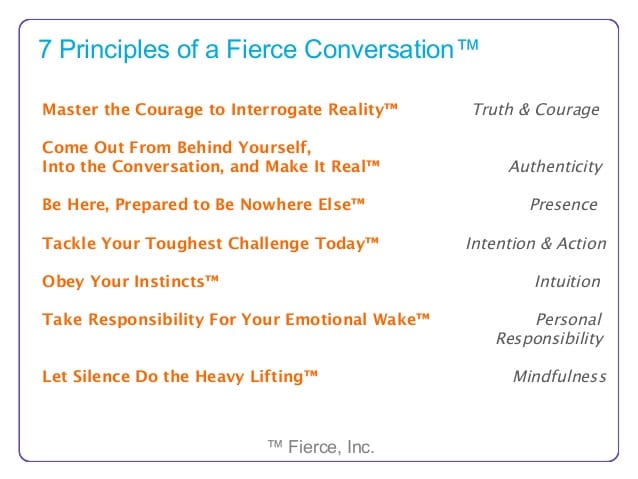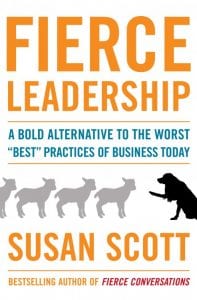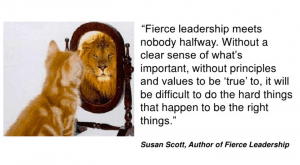 When Fierce Conversations was published in 2002, (a new edition was released in May, 2017), it rocketed up the best-seller list and made Susan Scott one of the most sought-after self-improvement and HR counselors and keynoters in America. The rocket sled was propelled by the notion that authentic, unadulterated, face-to-face communication had the power to transform our lives and our work, and that while no single conversation is guaranteed to change the trajectory of a career, a company, a relationship, or a life, any single conversation can.
When Fierce Conversations was published in 2002, (a new edition was released in May, 2017), it rocketed up the best-seller list and made Susan Scott one of the most sought-after self-improvement and HR counselors and keynoters in America. The rocket sled was propelled by the notion that authentic, unadulterated, face-to-face communication had the power to transform our lives and our work, and that while no single conversation is guaranteed to change the trajectory of a career, a company, a relationship, or a life, any single conversation can.
Scott’s follow-up book, Fierce Leadership, which applied her principles to fostering bold-thinking among managers, marshaling organizational teamwork and cultivating executive leadership prowess was another grand slam, the culmination of over 10,000 hours of management consulting across the globe. Thousands have found Susan’s insights the most inspiring of any business books in a generation.
Seattle24x7’s executive editor sat down with Ms. Scott on how the stratagems of this Fierce author and business consultant translate into the hypermodern spheres of social media, political tribalism, cyber bullying, and gridlock where the lost art of productive conversation has gone missing.
To those unfamiliar with the best-selling books, a “Fierce Conversation” is not one that is aggressive or confrontational, but rather one that is honest, purposeful, self-affirming and radically transparent. Let the conversation begin…
Seattle24x7: Welcome, Susan. We wanted to begin by asking you how you see the relationship of our increasingly mobile world of go-anywhere technologies and ever-present new media intersecting with the time-honored principles of Fierce Conversations. I know you have a bias for direct, face-to-face interaction so where does technology enter in, if at all?
 Susan Scott: That’s a great question, so let me start by saying I’m a huge fan of technology. I’m an early adaptor, and of course we use technology in a myriad of ways inside our company walls and with our clients.
Susan Scott: That’s a great question, so let me start by saying I’m a huge fan of technology. I’m an early adaptor, and of course we use technology in a myriad of ways inside our company walls and with our clients.
We have a lot of virtual meetings, whether we’re sharing screens or teleconferencing via Skype and we really enjoy those virtual sessions. In fact, in the new edition of Fierce Conversations, I talk about how to make virtual meetings more effective.
In our training space, we teach people to have conversations that get results. Our clients sometimes inquire whether we can give them asynchronous, non-facilitated training so that their employees can learn anytime, anywhere. And yet, the research shows that when offered online, employees do not always sign up. They are interested in self-directed learning, and sometimes, we shouldn’t make the assumption that means online. With virtual, they may not pay attention. And worse, they may not practice what the online course offers. So our experience has been that, wherever possible, face-to-face learning has been more impactful.
We know the futility of pointless conversations, which include online conversations, in terms of the time and money they are costing people and companies. Sometimes we need to step away from our devices and dig deeper into the issues under discussion.
Seattle24x7: Could you spotlight a couple of the strategies or techniques you cover in the new edition regarding online meetings?
Susan Scott: I’m happy to do that. In fact, I’m going to be putting out some resources that people can download on some of these details.
One of the things we don’t know when we’re having a virtual meeting or conference call is where everybody’s “head” is who is attending the meeting. Someone might be texting under the table about what’s for dinner or posting what do you want to do this weekend? Or they might be thinking about upcoming meetings and preparing mentally for that.
So one of the things that works for virtual meetings and conference calls is to say, up front — Here is our topic. This is why it is significant. By the end of our conversation, before we log out, I’m going to ask each one of you to give your best advice regarding this topic.
Make sure you have a list of who is in the virtual meeting, who is on the conference call. Call on every single person for their thoughts, their questions, their concerns, their input, and then, at the end of the call, their best advice on the topic.
When we can do that, people learn that virtual meetings and conference calls are not places where they can shrink their subatomic particles and vanish while thinking about other stuff. The thinking is — I really need to be present so that when I give my advice, it’s the best possible advice I can give and it will be welcomed and appreciated.
Seattle24x7: Besides video conferencing, are there any other new media forms where productive, transparent communication can approach verbal “Fierceness” in text? Let’s say via email, via Twitter, or as a Facebook update?
Susan Scott: Well, increasingly people are turning to email as well as social media to share their thoughts and viewpoints. Things like Twitter, Facebook, Snapchat and YouTube are all tools in building relationships.
 However, communicating via email or text is very different than having a conversation and an exchange of ideas that get you the results you want.
However, communicating via email or text is very different than having a conversation and an exchange of ideas that get you the results you want.
So emails and texts are wonderful and I use them all the time. But I always have to pay attention to where I use email. I like to use it to send out short information, or a short question, or a request for a meeting.
I would not use it to confront someone, or to give feedback, unless I’m praising them and drawing attention to something extraordinary that they did.
When all we have are words on a screen, we cannot see the person’s face or hear their tone of voice. As a result, we tend to put our own interpretation on those words. There’s something about human nature that often drifts to the dark side. Everybody’s had that experience where they are absolutely shocked to discover how a perfectly innocent email or text that they sent out was totally misinterpreted by somebody on the receiving end.
There’s always the risk of being misinterpreted when you send an email or text. One option? Stop and pick up the phone, or walk down the hall.
Seattle24x7: Emojis seem like a poor substitute for real expression?
Susan Scott: And the reason we use those all the time is because we’re trying to signal, “See, I’m not mad, I’m not upset, I’m happy!” Emojis can at least be useful for that.
Seattle24x7: Do you have a favorite Emoji?
Susan Scott: Well I typically use a Heart ♥️ to let people know that I have great affection for them, and there’s one with big round eyes ? like ‘What the heck?!” [LAUGH]. Sometimes I’ll use that one.
Seattle24x7: Another factor that seems to make online conversation very difficult is online anonymity. A lot of the vehemence in blog comments and tweets is attributable to the fact that people hide out behind imaginary personas or avatars. You write a lot about anonymity in your books as not being helpful. You also point out that anonymity is antithetical to authenticity which is a core component of a “Fierce Conversation.” How do you feel about anonymity, either online or offline?
 Susan Scott: There is no room for anonymity of any kind in any company or family or relationship that wants to get good work done, and wants to enrich relationships. The first chapter in Fierce Leadership and the subtitle of the book is “A Bold Alternative to the Worst Best Practices of Business Today.”
Susan Scott: There is no room for anonymity of any kind in any company or family or relationship that wants to get good work done, and wants to enrich relationships. The first chapter in Fierce Leadership and the subtitle of the book is “A Bold Alternative to the Worst Best Practices of Business Today.”
Well, the first chapter is devoted to the worst practice of “360 Anonymous Feedback.” The 360 part is valuable because I’m getting feedback from everybody around me. The anonymous part is absolutely horrible. I won’t try to go into all of the reasons. There’s an entire chapter devoted to why it is horrible and why we need to replace it.
When I’m doing a talk or a training and I ask people, “If somebody’s really happy with what you’re doing, what would you hope they would do?” They always say, “I hope they would tell me!” “‘And if someone’s unhappy with what you’re doing, what would you hope they would do?” “‘I hope they would tell me!” But we don’t. We tell ourselves it’s because we don’t think the other person can handle it. We think that they’ll probably fall apart.
If we’re being honest with ourselves, it’s we who don’t want to be in the room. It’s like Woody Allen who said, “I’m not afraid of death, I just don’t want to be in the room when it happens!” and I think we feel that way because we don’t know how to give feedback.
Seattle24x7: So “Fear” is a major obstacle to real feedback?
Susan Scott: There’s a huge sea change going on in performance management. We do not want anonymous feedback. We want face-to-face conversations. We don’t want it to be one way — we want it to be an interaction. We want to be able to ask questions about the feedback that we’re given. We want to be really clear about what it means and therefore what we need to do.
With anonymous feedback, we might receive five really great comments and one negative comment and that’s all we can think about. We’re wondering who thinks that about me and why because it’s just not true. There’s this negative emotional wake that kind of feedback leaves with us.
In terms of all of the haters and the bullies online, I would say that they’re sick. They’re sick, they’re cowards. And I can’t imagine how anybody could think that a good use of their time would be to tear down other people online in a way that nobody can know it’s them. What pathetic lives they must be living to spend their time doing that.
Seattle24x7: What is your impression of the corporate culture here in Seattle? Is there something about our Northwest environment that makes it more conducive to some of the practices you espouse in Fierce Conversations?
 Susan Scott: I didn’t grow up here but have lived in Seattle for a very long time now and am so happy to be here. As I continue to travel globally, I’m always very happy to come home to Seattle. And one of the reasons is because we’re a very liberal-minded community where we not only have our views, but we’re very interested in competing views.
Susan Scott: I didn’t grow up here but have lived in Seattle for a very long time now and am so happy to be here. As I continue to travel globally, I’m always very happy to come home to Seattle. And one of the reasons is because we’re a very liberal-minded community where we not only have our views, but we’re very interested in competing views.
In some parts of the country, that’s not as true. People have beliefs that they adhere to even if it can be very clear to them that their beliefs are actually not leading to the results they say they want. It’s very hard to let go of a belief if you’ve held onto it for a long time. I mean people don’t like to be wrong about their beliefs, and so they become quite adamant that what they believe is the truth.
One of the things about the Pacific Northwest, besides its physical beauty, is that most of the people that we work with here and most of my friends and family understand that no one single person owns the entire “capital T” Truth about anything. There are always multiple, competing realities existing simultaneously on just about any topic under the sun.
A leader’s job is not to be right — a leader’s job is to get it right for his or her company. And to do that requires encouraging, inviting, competing ideas and thanking people for pushing back against some of their thoughts. That is the only way we get to real innovation.
Otherwise tomorrow is gonna be a whole lot like yesterday because nothing new is emerging. So I do love where I live.
Seattle24x7: You mentioned the phrase “liberal minded” in relation to Seattle and I don’t want to pin that on you, but I did want to ask you about the tribalism among people these days, between Red states and Blue states, between Republicans and Democrats, that has created a polarizing wedge in our society. You write about “cross boundary collaboration.” To use another Susan Scott phrase, “What fresh hell is this?” How do we deal with these divisions and still come together?
Susan Scott: “What Fresh Hell is this?” was my mother’s favorite phrase. On that note, our work as a consulting and training company has become increasingly relevant since we started 16 years ago. For example, how do you relate when you’ve got somebody who refuses to even listen? It isn’t easy. You know, there are some people who feel so passionate about what they believe that anybody with a different view isn’t even allowed to finish their sentence before they jump back in to make their case stronger.
There’s no learning going on in this scenario. This was a problem with Obama, who I voted for. Every President has struggled to get Democrats and Republicans to work together. This is certainly a problem with Trump and if we cannot pull together, if we cannot work for the common good, rather than some kind of precious self-interest, then we’re not going to make the best decisions for the country, for our company, or for our families.
Boy do I wish I could get into the U.S. Congress and do a little work there because I think a lot of their meetings are utterly pointless. I hate to say it, but I think some people are just going to have to retire and let some of the younger voices come in.
Here at Fierce, we have an awful lot of Millennials in our ranks. I love them because they’re far more open to debate and dialogue. And they’re smart. They’re well intended. They’re not entrenched in their views. They’re not excited about making other people wrong.
Seattle24x7: In your book, Fierce Leadership, you write about a character named Charles who is a leader with many self-inflicted problems. “Don’t be this man,” you write. “Become bored with puffery and posturing, ducks and dodges. Recognize legislated optimism when you hear it, and decline to play that game. Lobby for getting to ground truths early in the game, so that your challenge becomes how to respond to opportunities, not how to fix problems.” This sounds a lot like our current president, and a repudiation of his divisive habits, beliefs and mendacity. In the book, you describe how this CEO was turned out. It’s not so simple with government. How can we learn to manage with this kind of leadership?
Susan Scott: Charles was a real person. But, of course, I changed the names of everybody in the book to protect the guilty and the innocent. He was very puffed up with himself and communication was really one way, from him to everybody else. The reverse was not valued, it wasn’t welcomed. If you didn’t agree with Charles, you were out. And it got ugly fast. The sad thing is, he was a very intelligent person. And he came into an organization with some great ideas about what could happen, but he offended so many people. He did not capture the hearts of anyone, and so nobody would help him get anything done.
Seattle24x7: Gosh, that sounds familiar.
Susan Scott: I do not envy the people that are in the White House right now. That must be a very tension-filled, fear-filled environment. Like who’s gonna be next, and might I say the wrong thing, or make the wrong move, and be tossed out? It really is very concerning when I look at Trump’s modus operandi. I do not believe that he can be influenced, although I’d like to think he could.
I would like to have an hour alone with him myself just to say a few things to him, and see if I can get his attention. That’s an arrogant thing for me to imagine, that I could make a dent.
 Seattle24x7: What would you say to him?
Seattle24x7: What would you say to him?
Susan Scott: I would need to prepare long and hard. But one of the things I think I would say, is that if you want to remain the president, you’re going to have to do some things differently. So if [LAUGH] you want to remain President, I want you to see a shrink, [LAUGH] a really good one to help him understand why his knee jerk reaction to criticism is to wound, instead of explore. Fierce conversations enrich relationships and since relationships are our most valuable currency, no one in a leadership role can afford to trash relationships left and right. And I’d sure like to help Trump with his messaging. It is possible to disagree without name calling and threats.
 Seattle24x7: It strikes us that Trump wants to come across as “Ferocious,” but is in fact a toothless lion?
Seattle24x7: It strikes us that Trump wants to come across as “Ferocious,” but is in fact a toothless lion?
Susan Scott: A “Fierce Conversation” is one in which we come out from behind ourselves, into our conversations, and make them real. It’s about being authentic. It’s about disclosing what you’re really thinking and feeling without laying blame.
There are facts. There aren’t “alternative facts.” Facts can be proved. They’re real or they aren’t real. Just because you say something happened or this many people showed up or whatever it is, does not make it true.
Seattle24x7: One of the great hopes for America’s future is the education of our children, and our citizenry. The educational field is another important service area for Fierce, Inc., your consulting arm.
Susan Scott: We would like to teach young people to understand that bad conversations, missing conversations, pointless conversations are the root of most problems. In business, they are a waste of time and money. We are all navigating our lives one conversation at a time. And we’re either having successful conversations or failed conversations. Some colleges and universities are using Fierce Conversations and Fierce Leadership as text books. I’d like the learning to begin in grade K. I’ve worked with little ones and they get it!
As we speak today, one of our employees is on an Island off the coast of Washington state meeting with the chairman of the school board and the principals of schools in that island community to talk about how to take principles and practices into their classrooms and share it with their students. This makes me deeply happy.
Life moves at the speed of conversations. Money moves at the speed of conversations. Relationships move at the speed of conversations. We need to know how to talk about the things that matter. And that’s what we are teaching, adults and children — what to talk about, how to talk about it and why it matters.
Seattle24x7: Last question — writing is a rather solitary task. How have you fine tuned your own senses to become such a keen observer of social behavior?
Susan Scott: Being alive and awake, paying attention. 13 years of running think tanks for CEOs. Well over 10,000 hours of conversations.
Seattle24x7: Thank you for the pleasure of this fierce conversation! [24×7]
Visit Fierce, Inc. online.


















